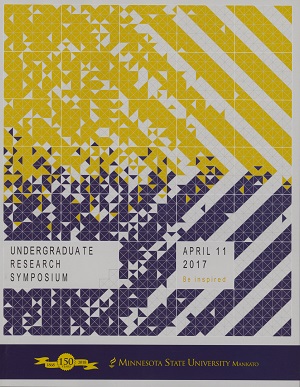5th Grade Language Sample
Location
CSU Ballroom
Start Date
11-4-2017 2:00 PM
End Date
11-4-2017 3:30 PM
Student's Major
Speech, Hearing, and Rehabilitation Services
Student's College
Allied Health and Nursing
Mentor's Name
Megan Mahowald
Mentor's Department
Speech, Hearing, and Rehabilitation Services
Mentor's College
Allied Health and Nursing
Description
Language samples are oral speech samples collected based off of five questions or tasks. This study explores how fifth grade students perform of different language sample tasks and explores the correlation between scores on the 6+1 Language Rubic and reading and writing standardized scores. Language samples were collected in a Midwestern, rural elementary school from 20 fifth grade students. The samples were then analyzed using a 6+1 writing rubric focusing on engagement, organization, voice, language use (vocabulary), and sentence fluency for each answer. After collecting this data, it was compiled and correlated to standardized reading and oral language scores. Results indicate that standardized reading assessment is correlated to the total rubric score for district reading assessments (r(20) = .48, p < .05) and state reading assessment scores is correlated to the total rubric score (r(20) =.47, p<.05). The results show that the rubric scoring is an effective tool to help identify the type and quality of language that is necessary for literacy achievement. More information/investigation is needed to determine why standardized language assessment and rubric did not correlate. Possibly the results are due to small sample size, and or the language sample assesses different information than the standardized language assessment. Additionally, further information about participants may be helpful about their demographics and a reading sample and a writing sample to compare it to the oral language sample. This would be a closer representation of their standardized scores. The results are based on a small population sample and collecting more scores from other kids in different school districts to get a larger sample size could show different results and correlations.
5th Grade Language Sample
CSU Ballroom
Language samples are oral speech samples collected based off of five questions or tasks. This study explores how fifth grade students perform of different language sample tasks and explores the correlation between scores on the 6+1 Language Rubic and reading and writing standardized scores. Language samples were collected in a Midwestern, rural elementary school from 20 fifth grade students. The samples were then analyzed using a 6+1 writing rubric focusing on engagement, organization, voice, language use (vocabulary), and sentence fluency for each answer. After collecting this data, it was compiled and correlated to standardized reading and oral language scores. Results indicate that standardized reading assessment is correlated to the total rubric score for district reading assessments (r(20) = .48, p < .05) and state reading assessment scores is correlated to the total rubric score (r(20) =.47, p<.05). The results show that the rubric scoring is an effective tool to help identify the type and quality of language that is necessary for literacy achievement. More information/investigation is needed to determine why standardized language assessment and rubric did not correlate. Possibly the results are due to small sample size, and or the language sample assesses different information than the standardized language assessment. Additionally, further information about participants may be helpful about their demographics and a reading sample and a writing sample to compare it to the oral language sample. This would be a closer representation of their standardized scores. The results are based on a small population sample and collecting more scores from other kids in different school districts to get a larger sample size could show different results and correlations.
Recommended Citation
Seeman, Allison; Eden Schwahn; and Sydney Loomis. "5th Grade Language Sample." Undergraduate Research Symposium, Mankato, MN, April 11, 2017.
https://cornerstone.lib.mnsu.edu/urs/2017/poster-session-B/10




